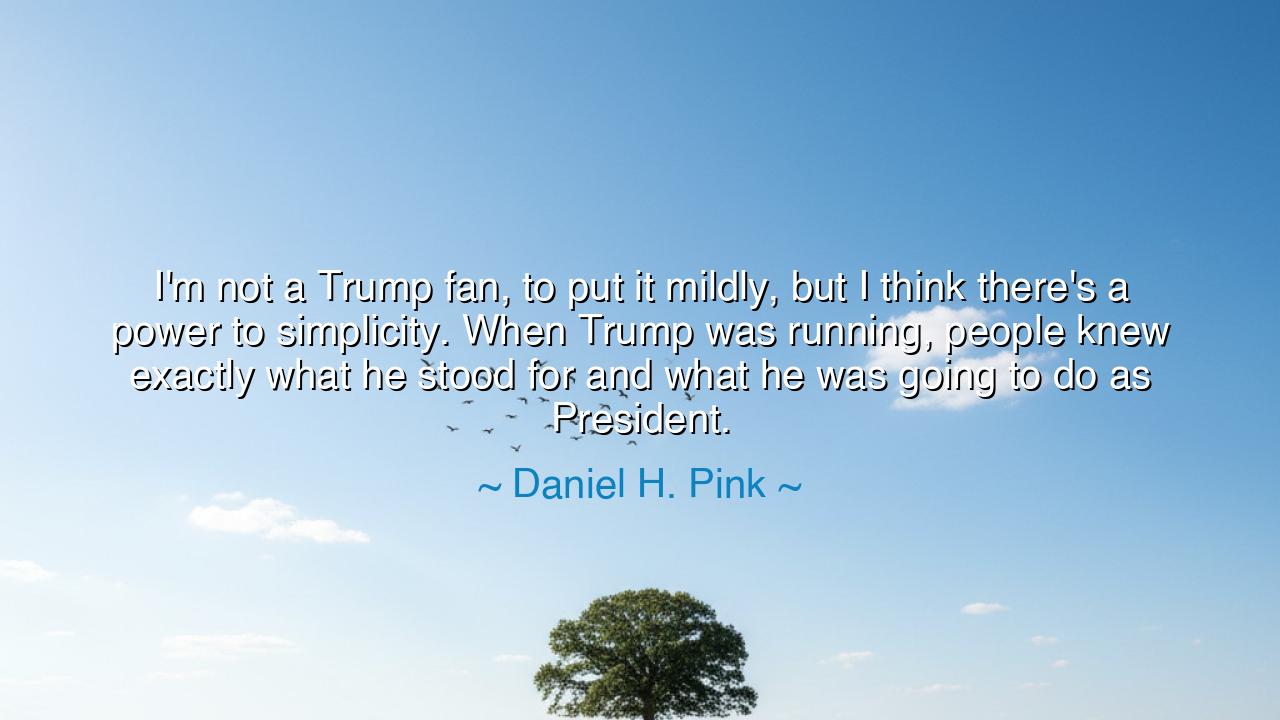
I'm not a Trump fan, to put it mildly, but I think there's a
I'm not a Trump fan, to put it mildly, but I think there's a power to simplicity. When Trump was running, people knew exactly what he stood for and what he was going to do as President.






Daniel H. Pink, student of human behavior and voice of clarity, declares: “I’m not a Trump fan, to put it mildly, but I think there’s a power to simplicity. When Trump was running, people knew exactly what he stood for and what he was going to do as President.” In this saying, he separates admiration from agreement, showing that one may oppose a leader’s path and yet still recognize the force of his methods. The truth he reveals is eternal: there is power in simplicity, for the human heart clings to what is clear and direct.
The meaning is sharp and universal. In politics, in war, in art, the victory often belongs not to the one with the most complex reasoning, but to the one who can frame his cause in words the common soul can grasp. Simplicity is not always truth, but it is always strength, for it unites the many, where complexity divides them. Pink reminds us that whatever one thinks of Trump, his clarity of message—bold, repetitive, unyielding—gave him a bond with millions who desired certainty in an age of confusion.
History offers us another witness in Julius Caesar, who with three words—Veni, vidi, vici (“I came, I saw, I conquered”)—summed up a campaign and secured eternal renown. His rivals could compose volumes, but his people remembered the phrase. So too did Abraham Lincoln, in his Gettysburg Address, compress vast suffering into a few sentences that still live today. The power of such simplicity is that it pierces the fog of confusion and lodges in the soul like iron in the earth.
Yet this truth bears danger as well. For simplicity can uplift or deceive. It can call men to freedom, as when Martin Luther King Jr. cried, “I have a dream.” But it can also ensnare, as when tyrants reduce the complexities of life to slogans that mask cruelty. Pink’s words remind us not to mistake clarity for righteousness, nor simplicity for wisdom. The power is real, but it must be tested against truth.
Therefore, let the seeker of wisdom learn this: when speaking to the people, be clear; when judging the message, be discerning. Simplicity in itself is neither good nor evil—it is the sword that cuts both ways. To wield it well is to inspire, to unite, to illuminate. To wield it falsely is to mislead and enslave. And so, while one may reject the man, one must still acknowledge the eternal lesson: there is power to simplicity, and it shapes the destiny of nations.






PTPhuong Thi
What I find intriguing here is the acknowledgment of ‘power’ without endorsement. It suggests that even communication styles we dislike can teach us something about human behavior. Maybe the real insight is that people want leaders who sound decisive, even if their policies are controversial. Do you think voters are more influenced by the *how* than the *what* when it comes to political messaging?
HCHai Cu
This quote makes me think about the psychology of persuasion. Maybe people didn’t just respond to Trump’s ideas, but to the way he packaged them — direct, emotional, and memorable. It raises a big question: in politics, is clarity more important than correctness? If people value simplicity over complexity, does that mean nuanced thinkers are at a disadvantage in modern democracy?
Hhoa
I appreciate how this comment focuses on communication rather than ideology. It’s true that people crave clarity, especially in politics where most messages are vague or overly technical. But I can’t help asking — does being simple automatically mean being transparent? Sometimes simplicity can mask manipulation or leave out important nuance. So where’s the line between clear messaging and oversimplified populism?
PVLe Ngoc Phuong Vy
This is an interesting take because it separates political approval from communication effectiveness. I think Daniel Pink has a point — simplicity can be incredibly powerful in leadership and messaging. But it also makes me wonder: does simplicity risk oversimplifying complex issues? Maybe Trump’s clarity appealed to people not because of content, but because it cut through the noise. Is that a strength, or a dangerous form of reductionism?